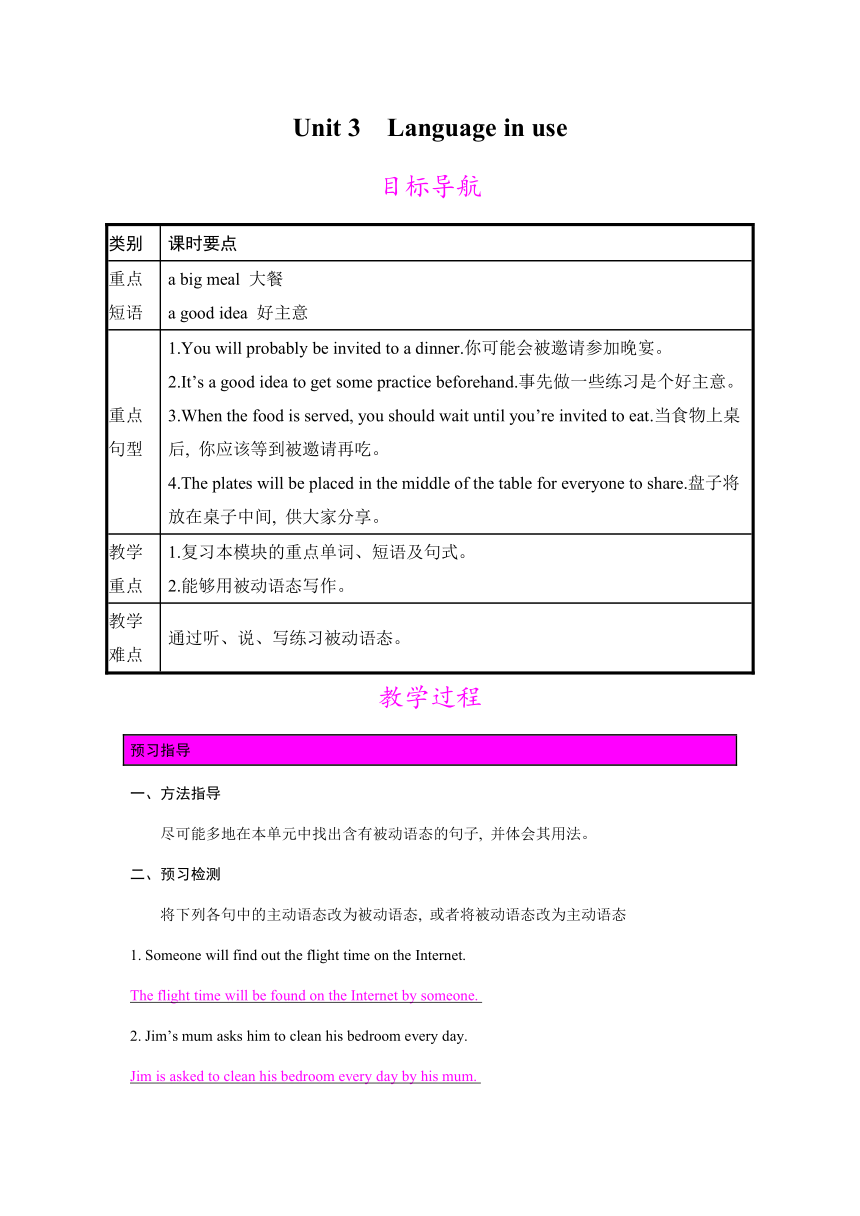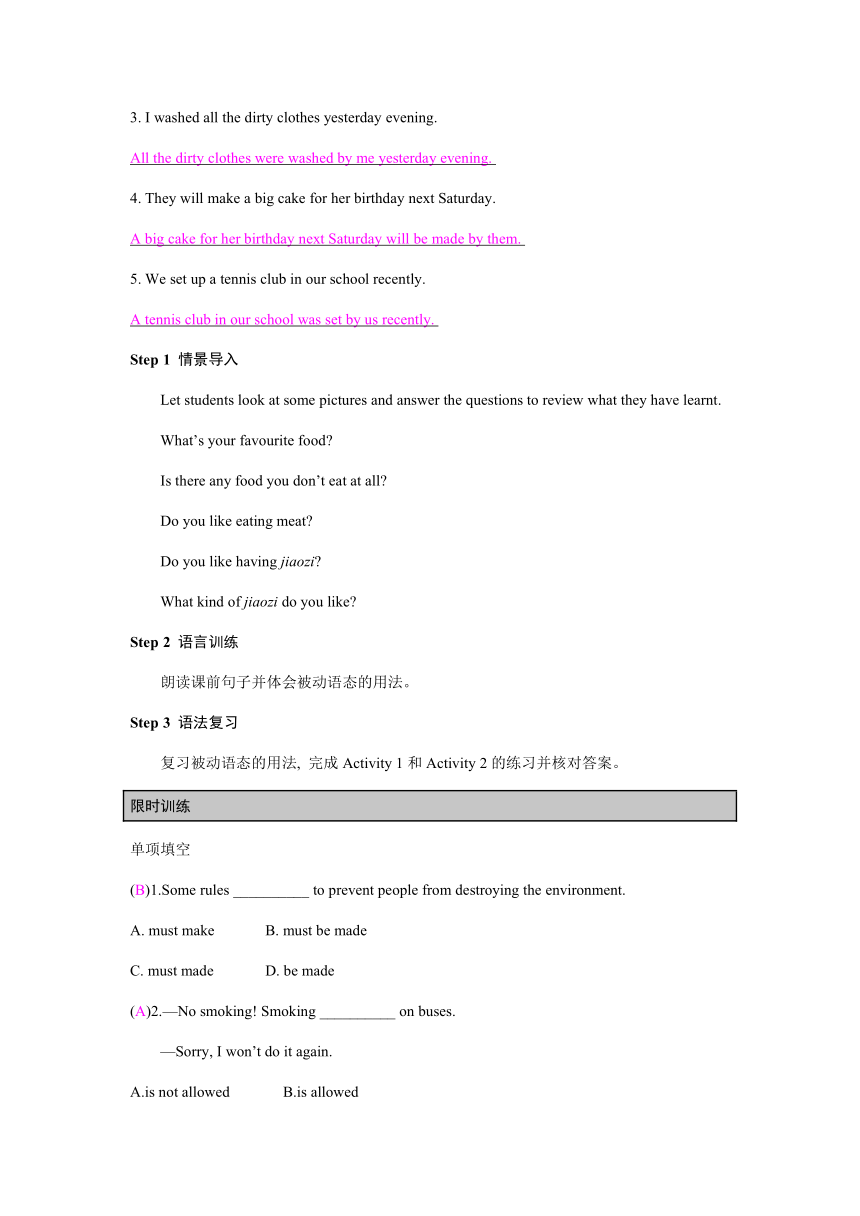Module 6 Eating together Unit 3 Language in use教案
文档属性
| 名称 | Module 6 Eating together Unit 3 Language in use教案 |

|
|
| 格式 | docx | ||
| 文件大小 | 21.2KB | ||
| 资源类型 | 教案 | ||
| 版本资源 | 外研版 | ||
| 科目 | 英语 | ||
| 更新时间 | 2023-03-05 00:00:00 | ||
图片预览


文档简介
Unit 3 Language in use
目标导航
类别 课时要点
重点短语 a big meal 大餐 a good idea 好主意
重点句型 1.You will probably be invited to a dinner.你可能会被邀请参加晚宴。 2.It’s a good idea to get some practice beforehand.事先做一些练习是个好主意。 3.When the food is served, you should wait until you’re invited to eat.当食物上桌后, 你应该等到被邀请再吃。 4.The plates will be placed in the middle of the table for everyone to share.盘子将放在桌子中间, 供大家分享。
教学重点 1.复习本模块的重点单词、短语及句式。 2.能够用被动语态写作。
教学难点 通过听、说、写练习被动语态。
教学过程
预习指导
一、方法指导
尽可能多地在本单元中找出含有被动语态的句子, 并体会其用法。
二、预习检测
将下列各句中的主动语态改为被动语态, 或者将被动语态改为主动语态
1. Someone will find out the flight time on the Internet.
The flight time will be found on the Internet by someone.
2. Jim’s mum asks him to clean his bedroom every day.
Jim is asked to clean his bedroom every day by his mum.
3. I washed all the dirty clothes yesterday evening.
All the dirty clothes were washed by me yesterday evening.
4. They will make a big cake for her birthday next Saturday.
A big cake for her birthday next Saturday will be made by them.
5. We set up a tennis club in our school recently.
A tennis club in our school was set by us recently.
Step 1 情景导入
Let students look at some pictures and answer the questions to review what they have learnt.
What’s your favourite food
Is there any food you don’t eat at all
Do you like eating meat
Do you like having jiaozi
What kind of jiaozi do you like
Step 2 语言训练
朗读课前句子并体会被动语态的用法。
Step 3 语法复习
复习被动语态的用法, 完成Activity 1和Activity 2的练习并核对答案。
限时训练
单项填空
(B)1.Some rules __________ to prevent people from destroying the environment.
A. must make B. must be made
C. must made D. be made
(A)2.—No smoking! Smoking __________ on buses.
—Sorry, I won’t do it again.
A.is not allowed B.is allowed
C. doesn’t allow D. allows
(A)3.To my great surprise, the famous athlete’s story __________ differently in the newspapers.
A. was reported B. reported
C. was reporting D. reports
(C)4.The pet dog is warm and loving. It __________ as a daughter of my family.
A. treats B. treated
C. is treated D. was treated
(A)5.When Tim __________ why he was late for school, he just kept silent.
A. was asked B. asked
C. was asking D. is asking
Step 4 复习本模块单词、短语和句型
1.浏览Activity 3方框中的单词, 明确词义, 选择合适的单词填空, 核对答案。
2.浏览Activity 4方框中的句子, 明确句意, 然后通读对话, 选择句子, 核对答案。
Step 5 听力训练
1.播放录音, 要求学生借助图片记忆录音内容, 并为Activity 5中的图片排序。
2.再次播放录音, 完成Activity 6的习题。
Step 6 阅读训练
阅读文章, 回答Activity 7中的问题, 并核对答案。
Step 7 认识世界
阅读文章, 学习美国的生日庆祝活动。
Step 8 写作训练
1.要求学生描述一次特别的用餐经历, 并考虑下列问题:
· when and where you ate it
· who you were with
· why the meal was special
· what happened during the meal
· what happened at the end of the meal
· what the nicest thing about the experience was
2.写下这次有意义或有趣的经历。
3.老师请几位同学在课堂上分享他们的经历, 并及时给予点评。
板书设计
英语中有两种语态:主动语态和被动语态。主动语态表示主语是动作的执行者, 被动语态表示主语是动作的承受者。例如:
We clean the classroom every day. (主动语态, 主语we是clean这一动作的执行者)
The classroom is cleaned every day. (被动语态, 主语the classroom是clean这一动作的承受者)
1.被动语态的用法。
(1)不知道或没有必要知道动作的执行者时。例如:
English is spoken all over the world.世界各地的人都说英语。
(2)强调或侧重动作的承受者时。例如:
This dictionary is used by most students.大多数学生都在用这本字典。
2.各种时态的被动语态。
(1)一般现在时的被动语态构成:am/is/are+动词过去分词。例如:
Knives and forks are used for most Western food.刀叉被用在大多数西餐中。
(2)一般过去时的被动语态构成:was/were+动词过去分词。例如:
The play was performed by the Beijing English Theatre Company.这部话剧是由北京英语剧团表演的。
(3)一般将来时的被动语态构成:be going to/will be+动词过去分词。例如:
You are going to be invited to a big meal.你将会被邀请去吃大餐。
教学反思
本节课的语言点在中考中经常出现, 老师应着重强调, 充分讲解动词语态的用法。学生课下需加强练习, 全面掌握动词语态的用法。
目标导航
类别 课时要点
重点短语 a big meal 大餐 a good idea 好主意
重点句型 1.You will probably be invited to a dinner.你可能会被邀请参加晚宴。 2.It’s a good idea to get some practice beforehand.事先做一些练习是个好主意。 3.When the food is served, you should wait until you’re invited to eat.当食物上桌后, 你应该等到被邀请再吃。 4.The plates will be placed in the middle of the table for everyone to share.盘子将放在桌子中间, 供大家分享。
教学重点 1.复习本模块的重点单词、短语及句式。 2.能够用被动语态写作。
教学难点 通过听、说、写练习被动语态。
教学过程
预习指导
一、方法指导
尽可能多地在本单元中找出含有被动语态的句子, 并体会其用法。
二、预习检测
将下列各句中的主动语态改为被动语态, 或者将被动语态改为主动语态
1. Someone will find out the flight time on the Internet.
The flight time will be found on the Internet by someone.
2. Jim’s mum asks him to clean his bedroom every day.
Jim is asked to clean his bedroom every day by his mum.
3. I washed all the dirty clothes yesterday evening.
All the dirty clothes were washed by me yesterday evening.
4. They will make a big cake for her birthday next Saturday.
A big cake for her birthday next Saturday will be made by them.
5. We set up a tennis club in our school recently.
A tennis club in our school was set by us recently.
Step 1 情景导入
Let students look at some pictures and answer the questions to review what they have learnt.
What’s your favourite food
Is there any food you don’t eat at all
Do you like eating meat
Do you like having jiaozi
What kind of jiaozi do you like
Step 2 语言训练
朗读课前句子并体会被动语态的用法。
Step 3 语法复习
复习被动语态的用法, 完成Activity 1和Activity 2的练习并核对答案。
限时训练
单项填空
(B)1.Some rules __________ to prevent people from destroying the environment.
A. must make B. must be made
C. must made D. be made
(A)2.—No smoking! Smoking __________ on buses.
—Sorry, I won’t do it again.
A.is not allowed B.is allowed
C. doesn’t allow D. allows
(A)3.To my great surprise, the famous athlete’s story __________ differently in the newspapers.
A. was reported B. reported
C. was reporting D. reports
(C)4.The pet dog is warm and loving. It __________ as a daughter of my family.
A. treats B. treated
C. is treated D. was treated
(A)5.When Tim __________ why he was late for school, he just kept silent.
A. was asked B. asked
C. was asking D. is asking
Step 4 复习本模块单词、短语和句型
1.浏览Activity 3方框中的单词, 明确词义, 选择合适的单词填空, 核对答案。
2.浏览Activity 4方框中的句子, 明确句意, 然后通读对话, 选择句子, 核对答案。
Step 5 听力训练
1.播放录音, 要求学生借助图片记忆录音内容, 并为Activity 5中的图片排序。
2.再次播放录音, 完成Activity 6的习题。
Step 6 阅读训练
阅读文章, 回答Activity 7中的问题, 并核对答案。
Step 7 认识世界
阅读文章, 学习美国的生日庆祝活动。
Step 8 写作训练
1.要求学生描述一次特别的用餐经历, 并考虑下列问题:
· when and where you ate it
· who you were with
· why the meal was special
· what happened during the meal
· what happened at the end of the meal
· what the nicest thing about the experience was
2.写下这次有意义或有趣的经历。
3.老师请几位同学在课堂上分享他们的经历, 并及时给予点评。
板书设计
英语中有两种语态:主动语态和被动语态。主动语态表示主语是动作的执行者, 被动语态表示主语是动作的承受者。例如:
We clean the classroom every day. (主动语态, 主语we是clean这一动作的执行者)
The classroom is cleaned every day. (被动语态, 主语the classroom是clean这一动作的承受者)
1.被动语态的用法。
(1)不知道或没有必要知道动作的执行者时。例如:
English is spoken all over the world.世界各地的人都说英语。
(2)强调或侧重动作的承受者时。例如:
This dictionary is used by most students.大多数学生都在用这本字典。
2.各种时态的被动语态。
(1)一般现在时的被动语态构成:am/is/are+动词过去分词。例如:
Knives and forks are used for most Western food.刀叉被用在大多数西餐中。
(2)一般过去时的被动语态构成:was/were+动词过去分词。例如:
The play was performed by the Beijing English Theatre Company.这部话剧是由北京英语剧团表演的。
(3)一般将来时的被动语态构成:be going to/will be+动词过去分词。例如:
You are going to be invited to a big meal.你将会被邀请去吃大餐。
教学反思
本节课的语言点在中考中经常出现, 老师应着重强调, 充分讲解动词语态的用法。学生课下需加强练习, 全面掌握动词语态的用法。
同课章节目录
- Module 1 Travel
- Unit 1 We toured the city by bus and by taxi
- Unit 2 It's a long story.
- Unit 3 Language in use
- Module 2 Education
- Unit 1 They don't sit in rows.
- Unit 2 What do I like best about school?
- Unit 3 Language in use
- Module 3 Life now and then
- Unit 1 They sometimes work harder.
- Unit 2 I think life is better today.
- Unit 3 Language in use.
- Module 4 Rules and suggestions
- Unit 1 You must be careful of falling stones.
- Unit 2 we must keep the camp clean.
- Unit 3 Language in use.
- Revison A
- Module 5 Look after yourself
- Unit 1 We'd better get you to hospital.
- Unit 2 Get off the sofa!
- Unit 3 Language in use.
- Module 6 Eating togethe
- Unit 1 When is the school-leavers' party?
- Unit 2 Knives and forks are used for most Western
- Unit 3 Language in use
- Module 7 English for you and me
- Unit 1 Have you ever been to an English corner?
- Unit 2 We all own English.
- Unit 3 Language in use
- Module 8 My future life
- Unit 1 Here's to our friendship and the future
- Unit 2 I know that you will be better at maths.
- Unit 3 Language in use
- Revison B
